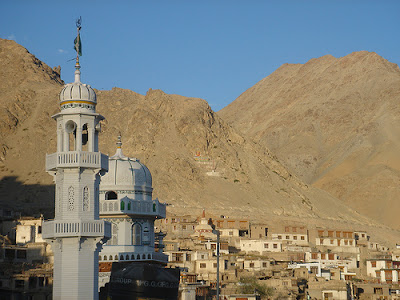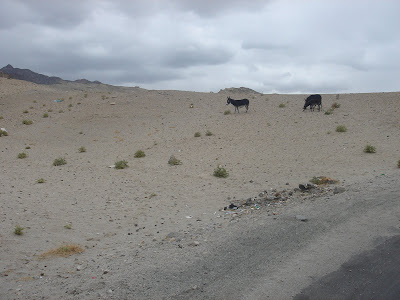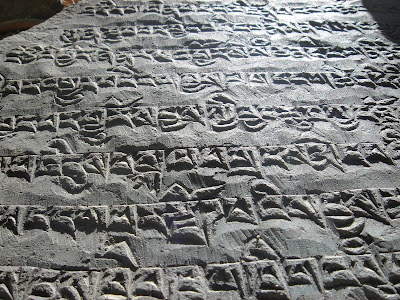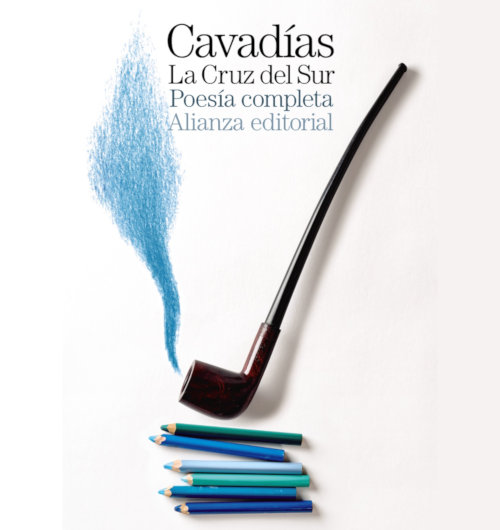Democracy inaction
Leh, Ladakh
I spent several hours today talking with Abdul Ghani  Sheikh, a Ladakhi Muslim writer, scholar and historian. He and his wife were extremely generous with their time (and with their namkeen tea and biscuits).
Sheikh, a Ladakhi Muslim writer, scholar and historian. He and his wife were extremely generous with their time (and with their namkeen tea and biscuits).
Our interview was delayed by a half hour because of a forced strike called throughout Leh. Coming into town I noticed every single shop was closed and shutters "downed." Only the Aluya restaurant had been "allowed" to stay open.
 Sheikh, a Ladakhi Muslim writer, scholar and historian. He and his wife were extremely generous with their time (and with their namkeen tea and biscuits).
Sheikh, a Ladakhi Muslim writer, scholar and historian. He and his wife were extremely generous with their time (and with their namkeen tea and biscuits).Our interview was delayed by a half hour because of a forced strike called throughout Leh. Coming into town I noticed every single shop was closed and shutters "downed." Only the Aluya restaurant had been "allowed" to stay open.
I asked one person if it was a "holiday," and they said yes. (People will just say anything to foreigners. ANYTHING at all to get you out of their face. )
Then I saw the riot police with their helmets, lathi canes, guns and ba mboo riot shields (yes, here riot shields are made of bamboo). I asked them if it was a political strike. They also said yes.
mboo riot shields (yes, here riot shields are made of bamboo). I asked them if it was a political strike. They also said yes.
Some holiday!
In a nutshell, the various factions of the Ladakh Buddhist Association are having a schism/war/leadership dispute and today was Faction B's turn to shut down the town. Last week Faction A had their chance.
When all the shops are shut, one must not mistake that for support of a cause or even interest in a cause. The shops are essentially forced to close by operatives of whatever political party wants to make a statement. Any shopkeeper not complying is threatened.
That way, there is no competition from bu siness or socializing, and townspeople are essentially forced to either stay home or attend the "meeting" most of them care little about. As Jon Stewart would say, Democracy Inaction!
siness or socializing, and townspeople are essentially forced to either stay home or attend the "meeting" most of them care little about. As Jon Stewart would say, Democracy Inaction!
Mr Ghani Sheikh said, "The shopkeepers hate it, the people hate it. They lose business, they waste time this way. But it has become so common, now they are used to it. They just accept it as part of life now."
That way, there is no competition from bu
Mr Ghani Sheikh said, "The shopkeepers hate it, the people hate it. They lose business, they waste time this way. But it has become so common, now they are used to it. They just accept it as part of life now."
In Kathmandu, Kerala and Calcutta, this would not come as a surprise. But "even" quaint, Buddhist Ladakh has become overly politicized ground.














1 comment:
Too much politicization may be bad but your comment about "quaint, Buddhist Ladakh" is a bit patronizing. You know, in the colonial times, the British used to view Indians as either "good, childlike" people (docile or traditional or religious) or "bad, childish" people (read politicized or rebellious or disobedient). Your view of "Buddhist" Ladakhis versus "political" Ladakhis is slipping, even if not intentionally, close to that sort of mentality.
Post a Comment